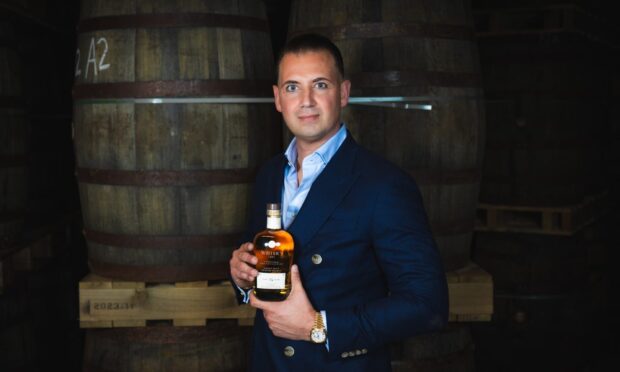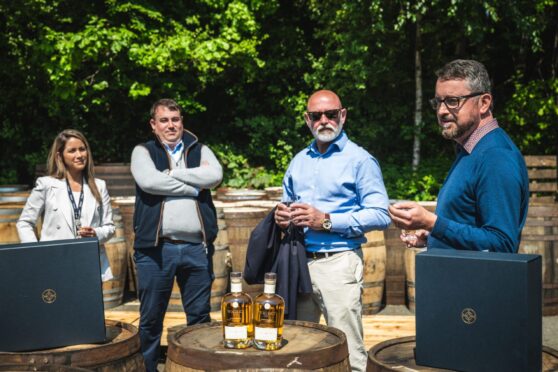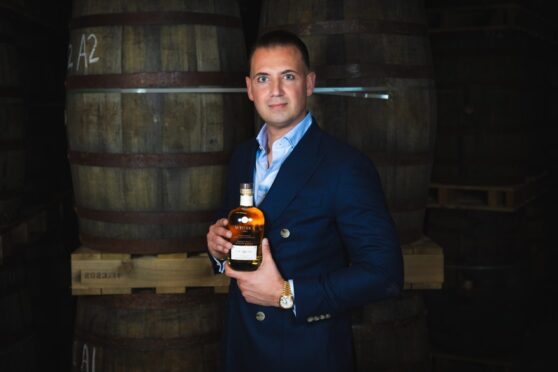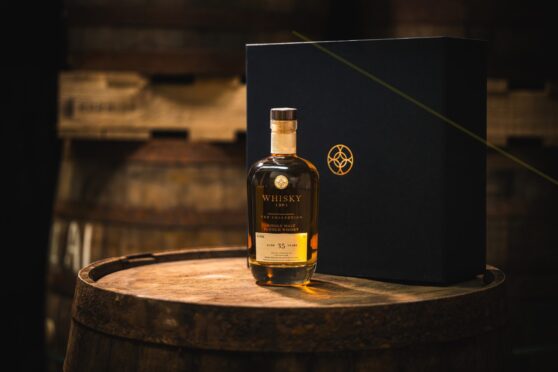Savvy millennials are turning to whisky investment in lieu of buying homes, the founder of cask broker Whisky 1901 has said as he launches the company’s first 35-year-old award winning scotch.
Whisky 1901, an investment firm set up by former stockbroker and tiler Aaron Damiano Sparkes, launches its first independent bottle of Glenburgie single malt this summer.
Hand-bottled in Glenrothes, having been distilled in Speyside in October 1988, the whisky will cost £1,325 a bottle when sold publicly for the first time in June.
Aaron, who is based in London, was in Fife to see the first bottle being filled at the company warehouse in Glenrothes.
The dram, called Edition One, was recently awarded a silver medal from The San Francisco World Spirits Competition, a gold medal from the Global Scotch Whisky Masters and a bronze award from The International Wine & Spirit Competition (IWSC).
Glenburgie distillery, near Forres in Moray, rarely releases its own single malt, with most of its liquid normally used in Ballantines blend.
Whisky 1901 cask investment
Investments in whisky casks have increased over the last five years, driven in part by millennials unable to get on to the housing ladder, Aaron said.
He explained how a younger generation was ploughing money into the expanding market, and the advantages they have in allowing their investments to mature for longer.
Millennial is a term used to describe a person born between 1981 and 1996..
Whisky tends to appreciate in value as it gets older, with an average cask investment returning around a 36% annual realised net increase according to Nasdaq.
Whisky 1901 was founded by Aaron in 2019. The firm is a broker between whisky producers and clients.
Aaron’s entry into the industry happened by chance, he said, after he left school to become a tiler in his dad’s company.
He then went into stockbroking, before establishing his own company before the pandemic.
“I set Whisky 1901 up five years ago to have full autonomy over the cask offerings,” he said.
“We have grown from strength to strength in that five-year period.
“From a business point of view, our bottling ability creates another line of income for the business and allows our clients a proven exit strategy in years to come.
“The first bottle is a Glenburgie 1988. I am very pleased to say it has already won three awards.
“Our whisky expert Matt Chambers and I chose this cask and have not looked back since.”
Aaron explained the investment market was performing well, as returns were likely given the popularity surrounding Scottish whisky.
“We have noticed over the past 12 months is a younger generation coming into whisky.
“It is very expensive to get on to the property market across the UK.
“So we are finding younger generations of investors coming into whisky.
“It is a smaller entry-level price and of course, they have the time on their hands to hold the casks for a longer period of time too.
“Whisky is a long-term investment, you have to give it a lot of time, give that liquid the time to mature.
“As long as you give it that time, there is very little that can go wrong.
“That being said, it can of course go down as well as up. Which is why as a company, we only deal with the top companies in Scotland.”
Trade deals with Asia
Should the UK agree a free trade deal with India, potentially an additional £1bn in sales in the Asian country could be recorded over the next five years, according to the Scotch Whisky Association (SWA).
Most recent figures show the whisky industry contributes around £7.1 billion to the UK economy, with £5.3bn of that contributing to Scotland’s.
As much as £3.4bn of that is generated by production, with around 41,000 jobs linked with the whisky industry in Scotland alone.
Exports to China rose by 165% since 2019 while £950m in sales are made by US consumers each year, according to the SWA.
Emerging markets in Taiwan and Singapore are also causing a spike in the industry’s worth.
This is another contributing factor in the rise in the cask investment market, adds sales director, Ryan Fazackerley.
“The newer generations of investors are very savvy. They follow the news closely, the know what is going on in the world.
“There are a few key themes in the industry at the moment, the main one being the growth of the market in China and the Asian continent.
“If you look at SWA statistics, the growth of whisky sales to China has grown 165% over the last five years.
“That is incredible growth, to the point Asia now has overtaken Europe as the largest consumer market of Scotch whisky.
“It is a trend a lot of Scottish distilleries are jumping on the back of. You will see a number of companies opening markets in China and India. Everyone is seeing the growth pattern and following it.
“And with the free trade agreement developing with India, there is an expected £1 billion extra whisky exports to India if it goes through, over the next five years.”
For drinking, not collecting
Only 263 numbered bottles are available from Glenburgie’s no.14483, an ex-bourbon cask distilled on October 4 1988.
Arran hopes people drink the whisky and enjoy the “romance” of it, rather than allow bottles to collect dust as heirlooms.
He said: “This bottle is being released for consumers. That goes for every one of our bottles.
“This is a great whisky, from an underrated distillery.
“We want to put hidden gems out on the market, and this bottle has a real quality to it.
“We don’t want this bottle to be collected, we want this whisky to be drunk and enjoyed.
“That’s why we as a company have entered the bottling side of the industry. It is important for us to be seen actively becoming involved in the sale of whisky.
“And if we were just brokering whisky, we lose the romance the industry has.
“Whisky makes money because people are part of it, they buy it and enjoy it.”




Conversation